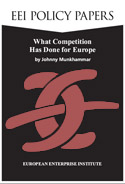Past Events
Joint EEI-GMF briefing on Honk Kong
29 November, 2005
The run-up to the WTO’s Hong Kong
Ministerial meeting in December has been hard-fought and contentious. The U.S.,
in an attempt to seemingly out-flank the EU, has proposed deep and far-reaching
cuts in its agriculture subsidies, putting pressure on the EU to counter that
offer before the Hong Kong meeting. Bound by internal fights and a steadfast
commitment to supporting rural communities, it seemed unlikely that the EU would be able
to match the American proposal, exposing itself to criticism for having failed Doha. But in the run-up to these important negotiations was this picture the true story-
or was agriculture just an easy scapegoat? In a time of domestic scandals and in the absence of
a strong pro-trade majority in the Congress, could President Bush really affect such change? Furthermore, to what extent is the
G20 really ready to opening-up its services markets or reduce its import
tariffs? Perhaps this is only a global game of naming and shaming where the EU
comes out at the loosing end?
To discuss the these
issues and to provide a general overview of the situation outside the EU before Hong Kong, the European
Enterprise Institute (EEI) and the German Marshall Fund of the United
States (GMF) on 29 November organized a breakfast briefing with leading American experts.
Stephanie Henning (Republican) served as the
Chief Counsel to the Trade Subcommittee of the House Ways and Means Committee in the
U.S. Congress. As majority international trade counsel, she advised Chairman
Thomas and other members of the Committee on domestic trade policy issues and
international trade agreement negotiations, and provided legal and policy
recommendations on disputes brought to the World Trade Organization. She will
be joined by Dr. Randall Soderquist (Democrat) a former senior advisor
to Senator Jeff Bingaman for Economic and International Affairs. Soderquist has
extensive experience advising the Democratic party on international, regional
and bilateral trade and their implications for labor and environmental
regulation. The discussion which was held under Chatham rules was moderated by EEI co-President Gunnar
Hökmark MEP.
For more info regarding this event please
contact EEI
European Dawn-after the social model
November 23rd, 2005
On 23 November the European Enterprise Institute
hosted the Swedish economist Johnny
Munkhammar for a presentation of his book European
Dawn-after the Social model. This book is an important contribution
to the ongoing debate on the European Social Model and has been described by
the ’99 Nobel
Laureate Robert Mundell as: ”A blockbuster tract that tackles head-on the
major problems confronting the European economy. It should be required reading
for all European politicians”.
In his book Munkhammar
launches a scathing attack on the so-called European Social Model exposing some
myths and reveals new facts on the current debate. A short summary will be available
soon.
Pre-Montreal Briefing
November 21st, 2005
“In
spite of its different character, climate change is still mostly seen as an
environmental problem and mainly the responsibility of the environment
ministers. This has to change.” stated the European
Parliament in its recent Resolution “Winning the Battle
Against Climate Change".
With
the implementation of the first phase of the Emission Trading Scheme and amid
political calls for increased reduction targets, the economic impact of a
capped market place for pollution permits is slowly but surely making its way
to the domestic agendas of European ministers for Finance and Economy.
On
the eve of the COP11 negotiations in
Montreal,
which will set the tone for the debate on the post-2012 future of the Kyoto
protocol, the European Enterprise Institute organised a pre-Montreal briefing
with Professor David Henderson. He is the former head of the OECD Economics and
Statistics Department and is a Fellow of Lincoln College in Oxford.
A former Visiting Fellow with the Centre for European Policy Studies in Brussels,
Mr Henderson has held a range of senior positions in the UK
government and is considered to be an authority on the economics of
international climate negotiations.
The
discussion was held in
Brussels
under so called Chatham
rules with representatives from the wider EU policy audience. For more info on
this event please contact Director of Policy
Black Coffee meeting on Social Europe
12th of October 2005
On October 12ththe European
Enterprise Institute hosted a Black Coffee discussion on the European
Social Model. At this event Professor André Sapir Senior Fellow at Bruegel and former economic adviser to the president of the European
Commission shared his views on the
characteristics of the European Social model. Professor Sapir is well known for his
influential report An Agenda for a Growing Europe, and more recently the Globalisation and the Reform of European Social
Models report, which served as a background document for the presentation at ECOFIN
informal meeting in Manchester, 9 September 2005
At the event Professor Sapir engaged in a vivant discussion with the audience. For a report of the event please follow this link.
page 3 of 9
